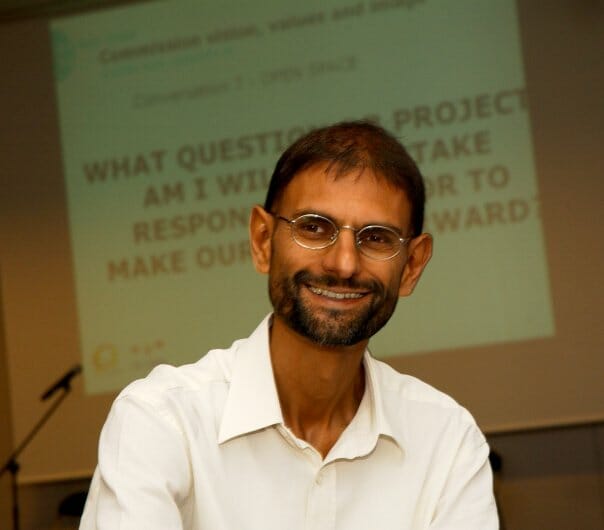
Feb 18, 2015 | Non categorizzato

Paolo Giusta
“The life and ideas of Chiara Lubich have introduced a radical novelty that totally surpasses the concept of power as dominion. The idea of power seen as the solitary peak of a pyramid is always present and dominant at times: we often tend to think that one man alone in command, with a clear vision and the strength to impose it is the best and more reassuring solution […]. Chiara has always had a great and absolute respect for power […]. At the same time, her relationships with people at the top of the civil hierarchical ladder (heads of states and governments, presidents of European institutions) or religious (popes, patriarchs…) never showed any sign of servitude. On the contrary, her respect for authority was expressed in a creative way, by offering ideas and suggestions in an attitude of dialogue and stimulus, and placing herself and the resources of the Focolare Movement at the disposition of projects for the benefit of society, especially the poor.
Co-responsibility. Upon exercising power within the Movement she had founded, Chiara set the basis […] for a collective management of responsibility, in line with the spirituality of communion, typical of her charism. At the presidency of the movement, especially for juridical motives, there is only one person, and Chiara wanted this person to be a woman, taking as the model, Mary, the mother of Jesus, who did not have any power except for that of love […]. This is one of the key concepts of Chiara’s charism: the hierarchy exists, and its role is irreplaceable, but stands in the background; what emerges is that we all are first and foremost, brothers and sisters, children of an only God who is love […]. And all of us learn from the example of Jesus, the sole and real master.
Collective leadership. I had the chance to personally see the way Chiara exercised her role of leader when in Stuttgart, 2004 and 2007 we prepared the two meetings of the movement and Christian communities of different Churches […]. I was struck by the way in which she gave room to each one, his ideas and questions. It was as if she was listening to a word God could have pronounced through the words of one of the participants. […]. She took each word seriously and asked the entire group to make their common decision, a true example of collective leadership in action […].
Exercising one’s own role and making room for the other. This was the essence of Chiara’s concept of power, as likewise the contrasting features: the person who holds a position of power has to fully exercise this role (being), and at the same time totally make room for the other, including the subordinates (nonbeing). Likewise, whatever their role and position in the hierarchical ladder, all give their own indispensable contribution (being) and in donating it, lose it since they cannot impose it (nonbeing). This dynamics creates communion, unity in diversity. In fact, for Chiara unity is never static, or something which cancels the components, but is new and surprising each time, because always in vital movement, it is an image of God and the relationship of love among the persons of the Trinity […].
Resolving conflicts together. A practical example of the power exercised as love, in Chiara’s view, is the management and resolution of conflicts. In face of a conflict there are different options: avoid the difficulties of facing it, letting the head decide for all, or else, undertake a journey together with all those involved in the conflict. It would be a long and probably painful journey to face the conflict and emerge with a solution, not with an individual decision, but through a group experience. This solution is not handed down either from the top or given from below, but is the result of a common effort in which each gives his version of truth, in order to reach a common solution.”
See complete text (in Italian)
Chiara Lubich
Politics for Unity
Making a world of difference
March 2015
Info: http://www.politicsforunity.com/
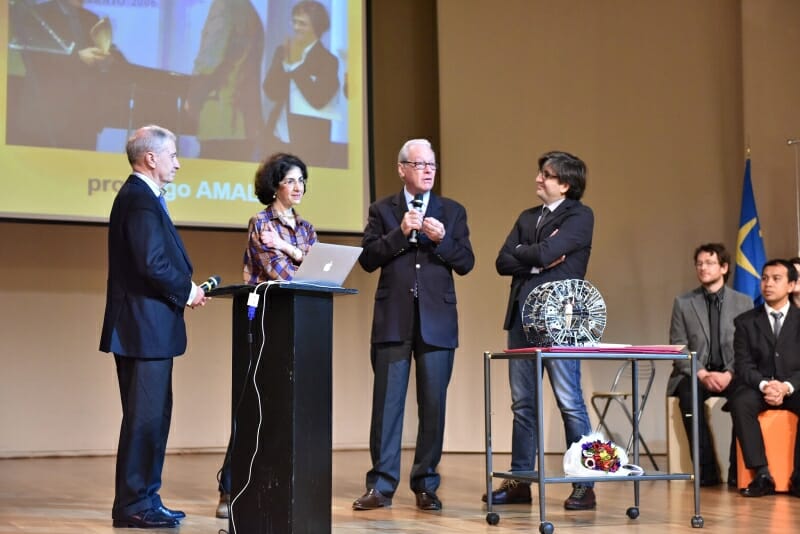
Feb 17, 2015 | Focolare Worldwide
 The infinitely small and infinitely big that interact to explain the universe, the application of discoveries such as the Higgs boson, in the medical, technological and social fields. Fabiola Gianotti, the next director of the CERN (European Nuclear Research Centre.) of Geneva, spoke about this on 15 February in Loppiano, before an audience of 800 people among which were scientists, enthusiasts of the scientific world, artists, friends, families and about 200 secondary school students.
The infinitely small and infinitely big that interact to explain the universe, the application of discoveries such as the Higgs boson, in the medical, technological and social fields. Fabiola Gianotti, the next director of the CERN (European Nuclear Research Centre.) of Geneva, spoke about this on 15 February in Loppiano, before an audience of 800 people among which were scientists, enthusiasts of the scientific world, artists, friends, families and about 200 secondary school students.
In short, it seems that science has once again become fashionable in 2015, year in which people are still beset by the economic crisis, but are likewise in search of “infinite spaces that re-focus on what we are, our dignity, and mission in life,» one of those in the audience said. The merit certainly goes to scientists like Gianotti, but also to events like the awarding of the Prize, “Renata Borlone, woman of dialogue.” It was an event of great educational values, where faith and culture intertwined to bring about moments of personal and social growth.
Dr. Giannotti received innumerable messages of congratulations, among which was that from Maria Voce: «The Renata Borlone Cultural Association and Sophia University Institute (IUS) join in the general acclaim, underlining in a particular way, the values that inspire Dr. Giannotti’s life as a woman and scientist.» The Focolare President stressed “the kinship of ideals and objectives of these two figures” (Gianotti and Borlone), though in diverse fields.
«The Higgs boson is considered as the site that gives rise to all the mass of particles in the universe – affirmed Lida Ciccarelli, postulator of the cause for the beatification of Renata Borlone – Renata too was fascinated, not only by science but by all that regards humanity, and had found that site, that field which had given meaning to her life and her daily existence: God. And just as the scientist moves to lift the veil of mystery surrounding the world of science – she continued – she had found in God the revelation of the “other” who asks for love, acceptance, comprehension, and sharing of joys and sufferings, with a human heart. She lived in this divine space and those whom she encountered found a renewed dignity in discovering that they are sons of God.»
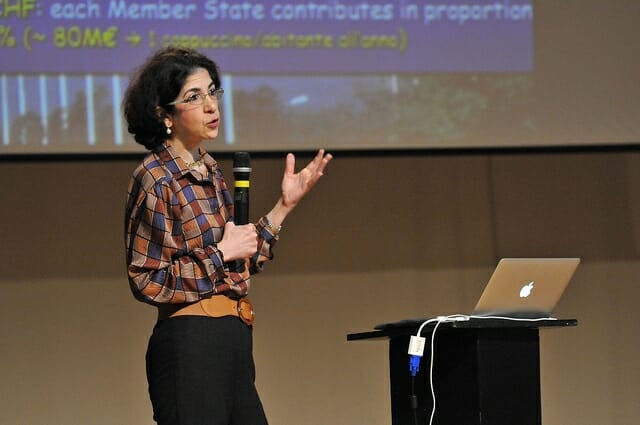 The Prize’s third edition was intended for scientific research enthusiasts and targets to also promote dialogue with those in the academic field who commit themselves to promoting a culture that respects the dignity of the human person. The reason for the conferment of the prize to Fabiola Gianotti, was read by IUS Prof. Sergio Rondinara: “For her elevated professional qualities, her passion in scientific research and her human capacity in guiding a great number of scientists and researchers involved in the CERN’s ATLAS experiment.”
The Prize’s third edition was intended for scientific research enthusiasts and targets to also promote dialogue with those in the academic field who commit themselves to promoting a culture that respects the dignity of the human person. The reason for the conferment of the prize to Fabiola Gianotti, was read by IUS Prof. Sergio Rondinara: “For her elevated professional qualities, her passion in scientific research and her human capacity in guiding a great number of scientists and researchers involved in the CERN’s ATLAS experiment.”
The prize statue is a work of the Chinese artist, Hung, and represents a miniature of a particle accelerator.
Dr. Giannotti’s speech was an intense and passionate exposition that captivated the audience’s attention, and she conducted them on a virtual tour of the universe of infinitely tiny, elementary particles and especially the Higgs boson, discovered at the end of 2012 thanks to the constant work of 3,000 scientists of 38 countries and the technology of the particle collider LHC (Large Hadron Collider), 27 km long, laid out at 100 meters under the ground between Switzerland and France.
«Some of you may wonder: what is so important about these particles? – the scientist said – in reality this question is intrinsically related to our lives, since if the particles did not have the masses they possess, we would not exist. If the electron did not have a mass, the atoms would not bond together and, therefore, chemistry would not exist and there would be no matter, the way we know it. So we exist also thanks to this Higgs mechanism.»
As to the applications of particle collider, she explained that these are widely used in the medical field to cure tumors. Dr. Giannotti concluded that the CERN research investigates fundamental queries on elementary particles and, therefore, on the structure and evolution of the universe, which are vital for their impact on daily life. «But the fundamental knowledge – she concluded – is in itself important because it is one of the irrevocable rights of man – beyond all the concrete applications, and is somewhat like art which is among the highest expressions of man as a knowledgeable being. And so, to negate the absolute importance of these activities would be like degenerating human nature itself.»
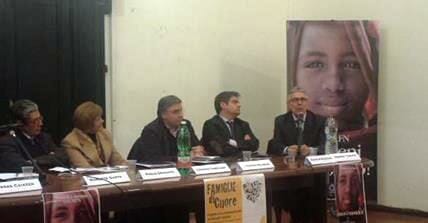
Feb 16, 2015 | Focolare Worldwide
 All the documents are stamped and now the child is a son or a daughter in every respect, a child upon whom to to pour all that love, which adoptive parents always have plenty of. Years of waiting and ocean-crossings did not stop them. After a first fleeting encounter in which child and parent became acquainted and some brief stays at hotels abroad, they are finally home. It is a unique and exhilarating experience to witness the completion of an adoption, however, more than a completion, it is also the beginning of an uphill journey. The first hurdle overcome, the newly diplomated parents are assailed by a thousand questions and often feel disoriented. It was for families such as these that “Families of the heart” was begun in Grazzanise, Italy, the brainchild of the Action for New Families Onlus (AFN), and with contributions from the Banco di Napoli Foundation, The project offers a one-stop free counseling service for adoptive families in a local area that provides expert advice, or simply the opportunity to meet with other families. It also provides free courses in which theoretical classes are alternated with social gatherings to promote an exchange of experiences between families, as well as the possibility of networking with other associations in the area. Adoption continues to remain a challenge because to this day still too many children are abandoned in institutions, both in the North and the South. It is a challenge that Chiara Lubich wanted to take on when, in 1967, she invited families who followed her to “empty the orphanages.” And that was how a myriad of families with or without children, opened heart and home to children who did not have a family, providing healing for their wound of abandonment. Mr and Mrs Gravante are responsible for the New Families Project in Campania. They explain: “Through this project we wish to equip families with tools that will strengthen their resources and help them to become world-families, open to the diversity of a daughter or son who comes from a faraway land with both genetic and cultural differences. It is a fascinating process but also demanding, as is retracing the life experiences of a child and helping him or her to make peace with them.” At the New Families Project – as with all authorised international adoption agencies – it is required to follow up with the family for the first three years of post-adoption, but often this time frame is not long enough. The process of the child’s integration in the new family and his or her inclusion in the social structures of an area, can require much more time. The adoptive families, far from being left on their own, need to have a relationship with other families like them, so that each day they can rediscover the value of their choice and regain their initial enthusiasm as they plan for the future, through a process that is the fruit of sharing. Stressing that this partnership is precisely what animates the association, Andrea Turatti, President of the New Families Project remarks: “We are also pleased to offer our thanks for the generous participation of the Bank of Naples in this opportunity for the territory of Naples, a region that well deserves it. In fact, of the 850 children who have found a family through the New Families Project, 180 have been welcomed into this region. And it was the maturity of this region that allowed the launching of the project that we hhope to export to the rest of Italy and beyond as a contribution to a more united society. ” For information: www.afnonlus.org
All the documents are stamped and now the child is a son or a daughter in every respect, a child upon whom to to pour all that love, which adoptive parents always have plenty of. Years of waiting and ocean-crossings did not stop them. After a first fleeting encounter in which child and parent became acquainted and some brief stays at hotels abroad, they are finally home. It is a unique and exhilarating experience to witness the completion of an adoption, however, more than a completion, it is also the beginning of an uphill journey. The first hurdle overcome, the newly diplomated parents are assailed by a thousand questions and often feel disoriented. It was for families such as these that “Families of the heart” was begun in Grazzanise, Italy, the brainchild of the Action for New Families Onlus (AFN), and with contributions from the Banco di Napoli Foundation, The project offers a one-stop free counseling service for adoptive families in a local area that provides expert advice, or simply the opportunity to meet with other families. It also provides free courses in which theoretical classes are alternated with social gatherings to promote an exchange of experiences between families, as well as the possibility of networking with other associations in the area. Adoption continues to remain a challenge because to this day still too many children are abandoned in institutions, both in the North and the South. It is a challenge that Chiara Lubich wanted to take on when, in 1967, she invited families who followed her to “empty the orphanages.” And that was how a myriad of families with or without children, opened heart and home to children who did not have a family, providing healing for their wound of abandonment. Mr and Mrs Gravante are responsible for the New Families Project in Campania. They explain: “Through this project we wish to equip families with tools that will strengthen their resources and help them to become world-families, open to the diversity of a daughter or son who comes from a faraway land with both genetic and cultural differences. It is a fascinating process but also demanding, as is retracing the life experiences of a child and helping him or her to make peace with them.” At the New Families Project – as with all authorised international adoption agencies – it is required to follow up with the family for the first three years of post-adoption, but often this time frame is not long enough. The process of the child’s integration in the new family and his or her inclusion in the social structures of an area, can require much more time. The adoptive families, far from being left on their own, need to have a relationship with other families like them, so that each day they can rediscover the value of their choice and regain their initial enthusiasm as they plan for the future, through a process that is the fruit of sharing. Stressing that this partnership is precisely what animates the association, Andrea Turatti, President of the New Families Project remarks: “We are also pleased to offer our thanks for the generous participation of the Bank of Naples in this opportunity for the territory of Naples, a region that well deserves it. In fact, of the 850 children who have found a family through the New Families Project, 180 have been welcomed into this region. And it was the maturity of this region that allowed the launching of the project that we hhope to export to the rest of Italy and beyond as a contribution to a more united society. ” For information: www.afnonlus.org
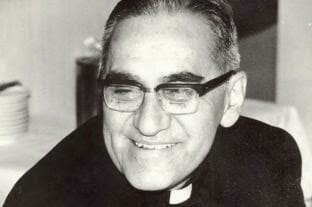
Feb 14, 2015 | Non categorizzato

“A preaching that does not denounce sin is not Gospel preaching,” Bishop Romero stated in one of his talks. His martyrdom, which took place on March 24, 1980 as he celebrated the Eucharist in the chapel of the hospital for terminally ill patients, where he also resided, gave strength to many Salvadoran families who had lost relatives and friends during the civil war which turned ruthless after his death. Still today his witness remains a powerful call to peace, brotherhood and reconciliation.
“The news that Pope Francis had signed the decree recognising the martyrdom in odium fidei (in hatred of the faith) of Bishop Oscar Arnulfo Romero caused much rejoicing among the people. Bishops had the bells rung in all the churches of El Salvador in expression of the great jubilation,” Father Filippo Casabianca writes from the Focolare’s Central American centre. “From when Bergoglio became pope everyone began to hope that, knowing the urgent needs of the poor and the shady schemes of some Latin American dictatorial regimes, the progress of the Cause would be unblocked. Soon there will be the Solemn Opening of the Cause of Beatification, in El Salvador.
What is the backstory of that block? “The missionary work of the Church during that period was traversed by tensions that undulated between genuine faithfulness to the Second Vatican Council’s teaching about a preferential option for the poor and being near to the least, to the temptation of some who felt that it was possible to be associated with movements that had a Marxist imprint. This is what they wanted to accuse Romero of, to the point of silencing his voice.” But, in El Salvador, the Focolare spirituality also has its roots planted in the soil of war horrors. The first focolarinos visited this land in the late 1970s. They came from Colombia until the first Mariapolises of 1982, which were held in Santiago de Maria.
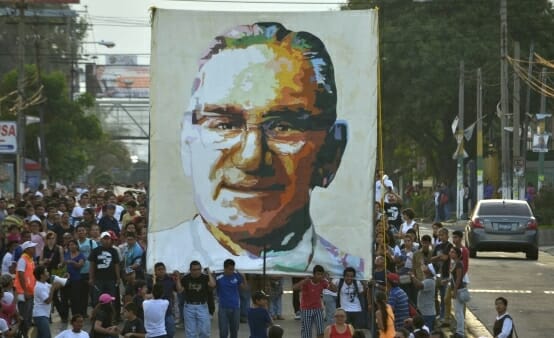 “The connecting roads were alternately patrolled by guerrillas and military” continues Filippo, “so you had to find makeshift ways to get around or you would be placed under interrogation that could lead to forced recruitment. “The war had followed the death of Romero and his message was quite alive in everyone.” “The words, the teaching and witness of Bishop Romero,” says Reynaldo, one of the first young people of the Movement in El Salvador, “powerfully resounded in those who had the fortune of discovering the Ideal of unity, particularly that call to opting for the poor. It was a strong call to Christian integrity, causing perplexity in some, embraced by many, at times manipulated. “Bishop Romero’s witness joined to the encounter with the experience of Chiara Lubich and her companions during the Second World War in Trent, made us embrace the charism of unity in a purer manner, and it helped us go against the tide.”
“The connecting roads were alternately patrolled by guerrillas and military” continues Filippo, “so you had to find makeshift ways to get around or you would be placed under interrogation that could lead to forced recruitment. “The war had followed the death of Romero and his message was quite alive in everyone.” “The words, the teaching and witness of Bishop Romero,” says Reynaldo, one of the first young people of the Movement in El Salvador, “powerfully resounded in those who had the fortune of discovering the Ideal of unity, particularly that call to opting for the poor. It was a strong call to Christian integrity, causing perplexity in some, embraced by many, at times manipulated. “Bishop Romero’s witness joined to the encounter with the experience of Chiara Lubich and her companions during the Second World War in Trent, made us embrace the charism of unity in a purer manner, and it helped us go against the tide.”
Going against the tide is still a feature of the Focolare Movement in El Salvador because of its social involvement. The rehabilitation of prisoners, for example, within the framework of the local Church’s prison ministry, involves Focolare teams. They visit the infamous Mariona Prison which houses the most dangerous criminal and drug-traffick bosses. They are currently in regular contact with some 180 people serving different sentences, who attend Word of Life meetings in groups of 18 people. In the most recent meeting someone remarked: “I ask forgiveness from my jail mates, because I treated them with violence, but I want to change.”
Other activities focus on social inclusion in a village at risk. The situation turned dangerous and the parish priest advised the Movement’s members to be careful. In another two cities, the Focolare runs kindergartens and after-school programmes oriented towards curbing the school dropout rate, which encourages criminal recruitment.
Following the example of Romero in El Salvador and beyond, there is a desire to be faithful to the Gospel by living for all, especially the small, the poor and the least.
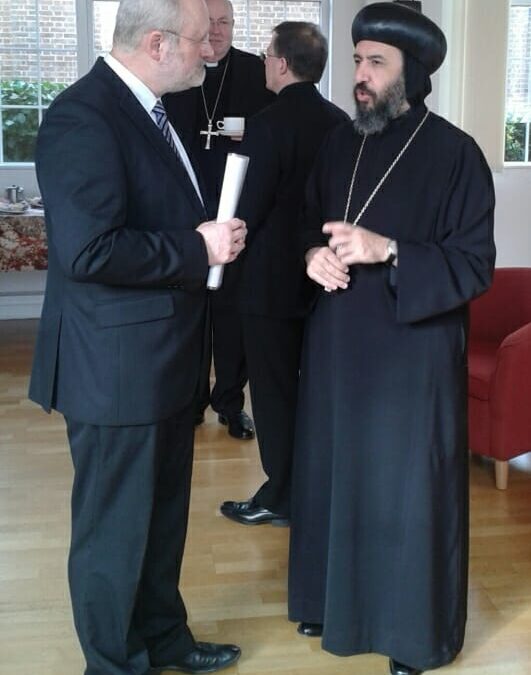
Feb 13, 2015 | Focolare Worldwide
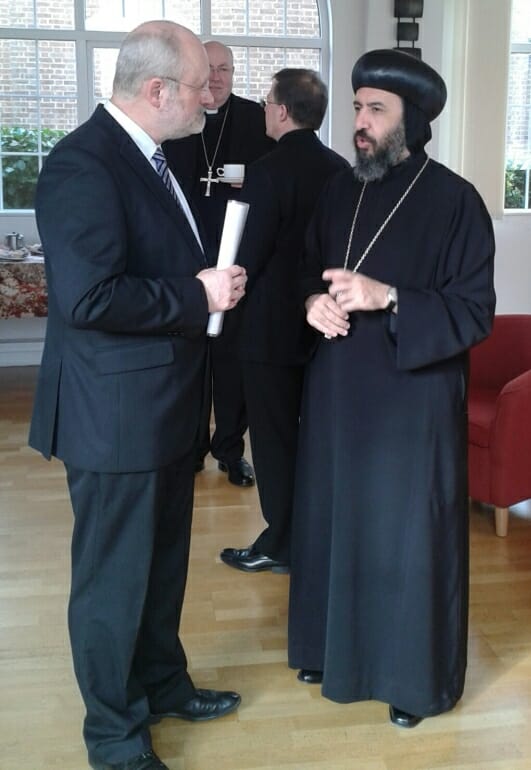 The Egyptian Churches are now celebrating – and not from 18 to 25 January as in many other countries – their Week of Prayer for the unity of Christians. Fadiah and Philippe of the Focolare Movement in Egypt tell of their participation in the various initiatives of the local Churches and how their prayer invoking the Lord’s protection over the entire Egyptian nation is central to the prayer week especially in this delicate moment. . “Receptive Ecumenism” means overturning our mentality which often conceals itself behind the way the members of the different churches deal with one another. Rev. Dr. Callan Slipper, from the Focolare Movement’s International Study Centre explained this during the ecumenical meeting at Welwyn Garden City (London) last 4 February. Slipper, who is also Regional Delegate for all the Churches in Hertfordshire County, in his speech (Chiara Lubich and convivial ecumenism: how the spirituality facilitates unity between Christians) expounded on how “instead of thinking that all would be better if the others tried to be more similar to us, and that therefore we have something to teach, we should instead, approach others to learn from them.» By going towards the others with this attitude, he said, «we would discover that we have nothing to hide, but can only admit our weaknesses and the need to be healed. This opens up a new relationship and leads us to a new conversion and deeper bond with Christ, in whom we can fully discover our true ecclesiastic identity.” Among the audience was a number of highly qualified people: 14 Catholic, Anglican and Lutheran and Coptic Orthodox Bishops coming from different parts of England together with the Secretary General of Churches Together in England, the national ecumenical organisation of the Churches of England. For them, the meeting was a “taste” of a new ecumenical methodology and a way of sharing experiences in their respective churches. During the same week, in Germany, at the Ecumenical Centre of Ottmaring, all remembered the importance of authentic Christian life that can counter the violent and liberticidal phenomena we have recently witnessed, as in the attacks in Paris. Gérard Testard, French, and member of the Executive Committee of the “Together for Europe ” network and founder of the interreligious “Efesia” initiative, was guest of honour: “Jesus’ encounter with the Samaritan woman at Jacob’s well – he said, referring to the phrase chosen for the Week of Prayer “Will you give me a drink? ” (John 4,7) – points out the way for this situation: Jesus breaks down all the barriers men have built and manifests himself as the Saviour of the world. The present-day events oblige us as Christians to work for unity, while the mission of unity goes beyond the Christian world to face the perils of unacceptable terrorism, violence, fanaticism.” Testard presented the positive experience of dialogue promoted also by the Council of Muslims of France and the French Bishops’ Conference, and “Efesia” created in 2007 in Lebanon. Christians and Muslims regularly meet on 25 March, feast of the Annunciation, since Mary is highly venerated also by Muslims. After four years the Lebanese authorities declared 25 March as a national Christian-Muslim holiday. It is historically the country’s first common feast day.»
The Egyptian Churches are now celebrating – and not from 18 to 25 January as in many other countries – their Week of Prayer for the unity of Christians. Fadiah and Philippe of the Focolare Movement in Egypt tell of their participation in the various initiatives of the local Churches and how their prayer invoking the Lord’s protection over the entire Egyptian nation is central to the prayer week especially in this delicate moment. . “Receptive Ecumenism” means overturning our mentality which often conceals itself behind the way the members of the different churches deal with one another. Rev. Dr. Callan Slipper, from the Focolare Movement’s International Study Centre explained this during the ecumenical meeting at Welwyn Garden City (London) last 4 February. Slipper, who is also Regional Delegate for all the Churches in Hertfordshire County, in his speech (Chiara Lubich and convivial ecumenism: how the spirituality facilitates unity between Christians) expounded on how “instead of thinking that all would be better if the others tried to be more similar to us, and that therefore we have something to teach, we should instead, approach others to learn from them.» By going towards the others with this attitude, he said, «we would discover that we have nothing to hide, but can only admit our weaknesses and the need to be healed. This opens up a new relationship and leads us to a new conversion and deeper bond with Christ, in whom we can fully discover our true ecclesiastic identity.” Among the audience was a number of highly qualified people: 14 Catholic, Anglican and Lutheran and Coptic Orthodox Bishops coming from different parts of England together with the Secretary General of Churches Together in England, the national ecumenical organisation of the Churches of England. For them, the meeting was a “taste” of a new ecumenical methodology and a way of sharing experiences in their respective churches. During the same week, in Germany, at the Ecumenical Centre of Ottmaring, all remembered the importance of authentic Christian life that can counter the violent and liberticidal phenomena we have recently witnessed, as in the attacks in Paris. Gérard Testard, French, and member of the Executive Committee of the “Together for Europe ” network and founder of the interreligious “Efesia” initiative, was guest of honour: “Jesus’ encounter with the Samaritan woman at Jacob’s well – he said, referring to the phrase chosen for the Week of Prayer “Will you give me a drink? ” (John 4,7) – points out the way for this situation: Jesus breaks down all the barriers men have built and manifests himself as the Saviour of the world. The present-day events oblige us as Christians to work for unity, while the mission of unity goes beyond the Christian world to face the perils of unacceptable terrorism, violence, fanaticism.” Testard presented the positive experience of dialogue promoted also by the Council of Muslims of France and the French Bishops’ Conference, and “Efesia” created in 2007 in Lebanon. Christians and Muslims regularly meet on 25 March, feast of the Annunciation, since Mary is highly venerated also by Muslims. After four years the Lebanese authorities declared 25 March as a national Christian-Muslim holiday. It is historically the country’s first common feast day.»
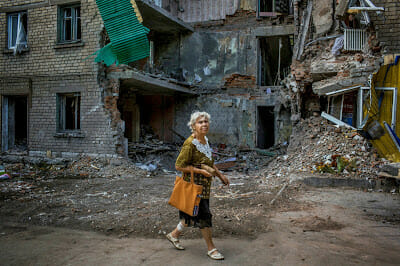
Feb 12, 2015 | Non categorizzato
 Father Mychayl is a Ukranian Greek Catholic priest from Kiev, who lives the Focolare spirituality. From the pages of Città Nuova magazine he helps us to follow the events that are taking place in his beloved and devastated country. A year after the outbreak of the conflict we asked him to give us his read on what has happened. “Nearly a year has gone by since the revolt on Maidan Square and up until now there have been 5000 deaths and over a million refugees. The war in Donbass has lasted for months. People are dying, the infrastructure is at the point of collapse, and hundreds of thousands of people are fleeing. Inside the patchwork of territories controlled by Ukrainians and by separatists, chaos of the gangs, the commanders who are at war with one another, the poorly-armed and even more poorly trained military may all have the side effect of becoming a war of everyone against everyone. According to Father Mychayl this is why now more than ever Ukraine needs an education on peace with everyone actively involved: young and old, teachers and children, parents and children: “A simple but engaging education on peace, based on the connection between theory and practice, values and experience. An education to affirm the culture of Peace, the only one able to respect and respond to everyone’s real and honest questions on the difficult road toward universal brotherhood in Ukraine.” When asked what steps would be necessary, he said: “Allow me to answer with something Chiara Lubich said in London in 2004: ‘(. . .) it would almost be necessary to propose to all those acting in politics to formulate a pact of brotherhood for their country, which places the good of the country well above any partial interest, be it individual, group, class or party. Because brotherhood offers surprising possibilities: it allows you to hold together and appreciate needs that might otherwise develop into irreconcilable conflict. For example, the experiences of local autonomies could be joined to a sense of common history; awareness of the importance of international bodies and of all the processes that tend to overcome barriers and allow important steps in the direction of unity in the human family.’” But the Ukraineian crisis has triggered the largest wave of refugees, since the Balkan wars: over 900,000 internally displaced persons. “It is no longer possible to live a normal life in the besieged city of Donetsk. The elderly – second-time witnesses of the horrors of war – are dying for lack of medical care, or have had to leave their homes. Many are not receiving the summer pension. In areas controlled by separatists there is everything in the shops and pharmacies, but no money. Banks and post offices have been shut down.” How can houses, roads and bridges be rebuilt, which are not only structural connections, but a means of healing invisible wounds? “It’s not an easy thing. Giving psychological help to the affected populations is less easy than building roads or sending humanitarian aid. For several years now Sophia University Institute in cooperation with Ukraine Iustitia et Pax, have been offering training courses that prepare young people to be contributing citizens for the common good of Ukraine.” “After the wave of protests and wars, the country is in need of these “Schools of involvement” that form students in civil and social involvement, rooted in the urban fabric; places where there is experience in political action founded on the values of sharing and nourished on the ideal of ‘universal brotherhood’. Thanks to the Maidan Square protests Ukraine has become a true nation, a people that wishes to build its life upon Christian values. Now it’s a matter of translating those values that were lived out during the protests at the square into the concrete facts in daily life; to take on the expectations and the deepest needs of the country so as not to fall into apathy definitively.” The schools of involvement do in fact provide interpretative models and operative proposals focused on spreading the culture of peace: “One of Ukraine’s principle challenges is the situation of internal immigrants, their integration in other regions of Ukraine, and the consequences of the hostility. The formation of flexible skills, therefore, to promote intercultural and interreligious dialogue, human rights, mediation, acceptance, mutual respect and reconciliation – these are the objectives we want to place at the centre of the pedagogy of the future.”
Father Mychayl is a Ukranian Greek Catholic priest from Kiev, who lives the Focolare spirituality. From the pages of Città Nuova magazine he helps us to follow the events that are taking place in his beloved and devastated country. A year after the outbreak of the conflict we asked him to give us his read on what has happened. “Nearly a year has gone by since the revolt on Maidan Square and up until now there have been 5000 deaths and over a million refugees. The war in Donbass has lasted for months. People are dying, the infrastructure is at the point of collapse, and hundreds of thousands of people are fleeing. Inside the patchwork of territories controlled by Ukrainians and by separatists, chaos of the gangs, the commanders who are at war with one another, the poorly-armed and even more poorly trained military may all have the side effect of becoming a war of everyone against everyone. According to Father Mychayl this is why now more than ever Ukraine needs an education on peace with everyone actively involved: young and old, teachers and children, parents and children: “A simple but engaging education on peace, based on the connection between theory and practice, values and experience. An education to affirm the culture of Peace, the only one able to respect and respond to everyone’s real and honest questions on the difficult road toward universal brotherhood in Ukraine.” When asked what steps would be necessary, he said: “Allow me to answer with something Chiara Lubich said in London in 2004: ‘(. . .) it would almost be necessary to propose to all those acting in politics to formulate a pact of brotherhood for their country, which places the good of the country well above any partial interest, be it individual, group, class or party. Because brotherhood offers surprising possibilities: it allows you to hold together and appreciate needs that might otherwise develop into irreconcilable conflict. For example, the experiences of local autonomies could be joined to a sense of common history; awareness of the importance of international bodies and of all the processes that tend to overcome barriers and allow important steps in the direction of unity in the human family.’” But the Ukraineian crisis has triggered the largest wave of refugees, since the Balkan wars: over 900,000 internally displaced persons. “It is no longer possible to live a normal life in the besieged city of Donetsk. The elderly – second-time witnesses of the horrors of war – are dying for lack of medical care, or have had to leave their homes. Many are not receiving the summer pension. In areas controlled by separatists there is everything in the shops and pharmacies, but no money. Banks and post offices have been shut down.” How can houses, roads and bridges be rebuilt, which are not only structural connections, but a means of healing invisible wounds? “It’s not an easy thing. Giving psychological help to the affected populations is less easy than building roads or sending humanitarian aid. For several years now Sophia University Institute in cooperation with Ukraine Iustitia et Pax, have been offering training courses that prepare young people to be contributing citizens for the common good of Ukraine.” “After the wave of protests and wars, the country is in need of these “Schools of involvement” that form students in civil and social involvement, rooted in the urban fabric; places where there is experience in political action founded on the values of sharing and nourished on the ideal of ‘universal brotherhood’. Thanks to the Maidan Square protests Ukraine has become a true nation, a people that wishes to build its life upon Christian values. Now it’s a matter of translating those values that were lived out during the protests at the square into the concrete facts in daily life; to take on the expectations and the deepest needs of the country so as not to fall into apathy definitively.” The schools of involvement do in fact provide interpretative models and operative proposals focused on spreading the culture of peace: “One of Ukraine’s principle challenges is the situation of internal immigrants, their integration in other regions of Ukraine, and the consequences of the hostility. The formation of flexible skills, therefore, to promote intercultural and interreligious dialogue, human rights, mediation, acceptance, mutual respect and reconciliation – these are the objectives we want to place at the centre of the pedagogy of the future.”
Feb 12, 2015 | Focolare Worldwide
During the General Audience of February 4, 2015 Pope Francis stated: “Brothers and sisters, when I hear the words “victory” or “defeat” I feel great sorrow, great sadness in my heart. They are not just words; the only just word is “peace”. This is the only just word. I am thinking of you, Ukrainian brothers and sisters …. Think, this is a war among Christians! You all share one baptism! You are fighting with Christians. Think about this scandal. And let us all pray, for prayer is our protest before God in times of war.”
While world diplomacy is mobilised, the facts seem to belie any prospects of peace. Yet there are people and institutions who work with courage to safeguard it, even at the risk of their own lives.
We ask Vera Fediva from the Focolare Movement and resident of Ukraine: How are the ordinary people living through this situation?
“This is a very difficult tiime for our country, filled with frustration and suffering. Nearly 5,000 civilian deaths, very many wounded and disabled, thousands of refugees and, unfortunately, we can’t foresee what the end will be. We often remember how our Movement was begun in the midst of the Second World War when everything crumbled. . . but we never would have imagined that it could happen in the twenty first century, nearly in the very heart of Europe and in such a tranquil country like Ukraine. Our community resides at Mukacevo on the western side of the country where there are no armed clashes. But psychologically it is difficult to hold up, also because many have relatives, friends, neighbours and even children who are fighting. Many have lost loved ones. We’re living in the midst of a situation in which nothing is stable. It’s difficult to plan anything. Nobody knows what will happen tomorrow. Perhaps a husband or an only son will leave for the war. We can only count on God who is Love. Just as when the Movement began. . . We do feel that it is important in such circumstances not to allow hatred into our heart, so that we can be able to forgive and even to pray for our enemies.”
As the Pope says, prayer is our protest. A year away from the beginning of the conflict, what did you do as a Focolare community and with other Christians so that this “protest” could be felt?
“For several years we have been working in defense of life at all of its stages; this allowed us to build relationships with people from several Christian Churches in our city. We held a few events together like the “March for Life” and “Family Fest”. We were encouraged by the “Ecumena” group from Kosice, Slovak Republic, which follows the spirituality of unity. Last year we organised a large “Prayer for Peace in Ukraine” event in the centre of the city, together with ten different Churches, which was largely attended by the general population. Then we continued to meet, and we shared three great moments of “Prayer for Peace” since the war began. We feel that the unity among us is particularly important now as Christians are fighting and killing one another in a war that is completely senseless. That’s our small and silent response to the Pope’s prayer, to overcome the scandal of the division and make a contribution to peace and reconciliation in our land.”
Feb 11, 2015 | Non categorizzato
Source: Centro Chiara Lubich, Video (in Italian)
VIDEO TRANSCRIPTION IN ENGLISH
“If at the basis of laws or social projects we place a mentality lacking in respect for the suffering, the disabled and the elderly, then little by little we create a false society. We give importance only to a few values like physical well-being, strength, exaggerated productivity and power, while we distort the purpose for which a nation lives; that is, for the good of the human person and society.
Health, as we know, is a precious gift which should be protected. Thus we should do all we can so that our bodies and everyone else’s, too, receive nourishment and rest, and are not exposed to sicknesses, accidents or an exaggerated amount of sports.
The body is also important for a Christian. But if there is a loss of health, we must remember that there is a Life which is not conditioned by the state of our health, but by the supernatural love that burns in our hearts.
And it is this superior Life which gives value to our physical life even when we are sick. If we consider illnesses merely from a human point of view, we can only affirm that they are misfortunes. But, if we look at illnesses from a Christian point of view, we can see that they are trials in which we must train ourselves for the great trial which awaits all of us, when we will have to face the passage to the next Life.
Didn’t the Holy Father just recently say that illnesses are spiritual exercises, sermons that God Himself preaches to us? People who are sick have a richness that others do not have; a richness of another kind. In speaking of asceticism and mysticism, the Church refers to illnesses not only in reference to the field of medicine, but as purifications that God sends, therefore as small steps towards union with God.
In addition, our faith tells us that in sickness a person participates in the sufferings of Christ. In this light, the sick person is another Christ crucified who can offer his or her suffering for what is of most value, the eternal salvation of all people.
In the frenzy of work and daily life we are tempted at times to see people who suffer only as marginal cases to help so that they can quickly recover and return to their activities. It doesn’t occur to us that they are the ones who even now can do the most, who can contribute the most.
People who are ill can positively carry out their role on behalf of humanity only if they are understood and loved. Love can help them to give meaning to their condition and to be aware of what they represent. And what holds true for the sick, holds true also for the disabled. People with a disability need love. They need to be recognized for the value that their life has: it is sacred, as every other life is sacred, with all the consequent dignity. They need to be considered as persons and, as much as possible, live normal lives among other people.
What should we say about the elderly? Every life calls for love, and the elderly are no exception. Today even the elderly constitute a problem because of the increased number of people in this age category due to the higher average life expectancy.
Thus we are aware of a tendency in society to isolate the elderly, to consider them as a social burden because they are no longer productive. We speak of the elderly as a category apart, almost as if we were not speaking of human beings. Besides the inevitable physical decline they experience, the elderly can become discouraged considering themselves as useless.
We must give new hope to the elderly. Advanced age is nothing other than the third season of life. Life that is born, develops, and declines, these are nothing other than three aspects of the one mystery of all life which derives from God-Love.
In certain Asian and African countries, the elderly are highly respected because they possess wisdom. In fact, the elderly person emphasizes which is essential, what is most important.
We remember what was said about St. John the Evangelist. At the age of eighty, while visiting the Christian communities, he was asked about the message of Jesus. He always replied: “Love one another,” as if he had nothing more to add. With this phrase he had truly focused on the central thought of Christ.
To distance ourselves from the elderly is to deprive ourselves of a patrimony. We must value them by loving them. And we must value them even when they are sick and seriously ill, when there is no more hope humanly speaking, and their need for assistance is pressing.
Before God, there is no life, no part of life, that is not worthy of being lived.
Chiara Lubich
![[:it]Chiara Lubich: «Non c’è porzione di vita indegna di essere vissuta»](https://www.focolare.org/wp-content/uploads/2015/02/20140211ChiaraLubich1986.jpg)
Feb 11, 2015 | Non categorizzato
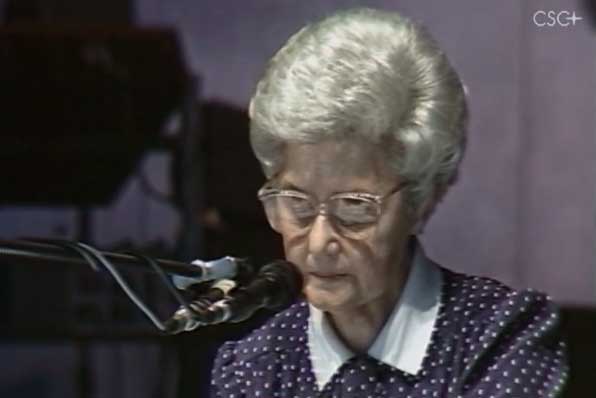 “If at the basis of laws or social projects we place a mentality lacking in respect for the suffering, the disabled and the elderly, then little by little we create a false society. We give importance only to a few values like physical well-being, strength, exaggerated productivity and power, while we distort the purpose for which a nation lives; that is, for the good of the human person and society.
“If at the basis of laws or social projects we place a mentality lacking in respect for the suffering, the disabled and the elderly, then little by little we create a false society. We give importance only to a few values like physical well-being, strength, exaggerated productivity and power, while we distort the purpose for which a nation lives; that is, for the good of the human person and society.
Health, as we know, is a precious gift which should be protected.
Thus we should do all we can so that our bodies and everyone else’s, too, receive nourishment and rest, and are not exposed to sicknesses, accidents or an exaggerated amount of sports.
The body is also important for a Christian.
But if there is a loss of health, we must remember that there is a Life which is not conditioned by the state of our health, but by the supernatural love that burns in our hearts.
And it is this superior Life which gives value to our physical life even when we are sick.
If we consider illnesses merely from a human point of view, we can only affirm that they are misfortunes.
But, if we look at illnesses from a Christian point of view, we can see that they are trials in which we must train ourselves for the great trial which awaits all of us, when we will have to face the passage to the next Life.
Didn’t the Holy Father just recently say that illnesses are spiritual exercises, sermons that God Himself preaches to us?
People who are sick have a richness that others do not have; a richness of another kind.
In speaking of asceticism and mysticism, the Church refers to illnesses not only in reference to the field of medicine, but as purifications that God sends, therefore as small steps towards union with God.
In addition, our faith tells us that in sickness a person participates in the sufferings of Christ. In this light, the sick person is another Christ crucified who can offer his or her suffering for what is of most value, the eternal salvation of all people.
In the frenzy of work and daily life we are tempted at times to see people who suffer only as marginal cases to help so that they can quickly recover and return to their activities. It doesn’t occur to us that they are the ones who even now can do the most, who can contribute the most.
People who are ill can positively carry out their role on behalf of humanity only if they are understood and loved. Love can help them to give meaning to their condition and to be aware of what they represent.
And what holds true for the sick, holds true also for the disabled. People with a disability need love.
They need to be recognized for the value that their life has: it is sacred, as every other life is sacred, with all the consequent dignity. They need to be considered as persons and, as much as possible, live normal lives among other people.
What should we say about the elderly?
Every life calls for love, and the elderly are no exception.
Today even the elderly constitute a problem because of the increased number of people in this age category due to the higher average life expectancy.
Thus we are aware of a tendency in society to isolate the elderly, to consider them as a social burden because they are no longer productive. We speak of the elderly as a category apart, almost as if we were not speaking of human beings.
Besides the inevitable physical decline they experience, the elderly can become discouraged considering themselves as useless.
We must give new hope to the elderly.
Advanced age is nothing other than the third season of life.
Life that is born, develops, and declines, these are nothing other than three aspects of the one mystery of all life which derives from God-Love.
In certain Asian and African countries, the elderly are highly respected because they possess wisdom.
In fact, the elderly person emphasizes which is essential, what is most important.
We remember what was said about St. John the Evangelist. At the age of eighty, while visiting the Christian communities, he was asked about the message of Jesus. He always replied: “Love one another,” as if he had nothing more to add. With this phrase he had truly focused on the central thought of Christ.
To distance ourselves from the elderly is to deprive ourselves of a patrimony.
We must value them by loving them.
And we must value them even when they are sick and seriously ill, when there is no more hope humanly speaking, and their need for assistance is pressing.
Before God, there is no life, no part of life, that is not worthy of being lived.
Source: Centro Chiara Lubich, Video (in italian)
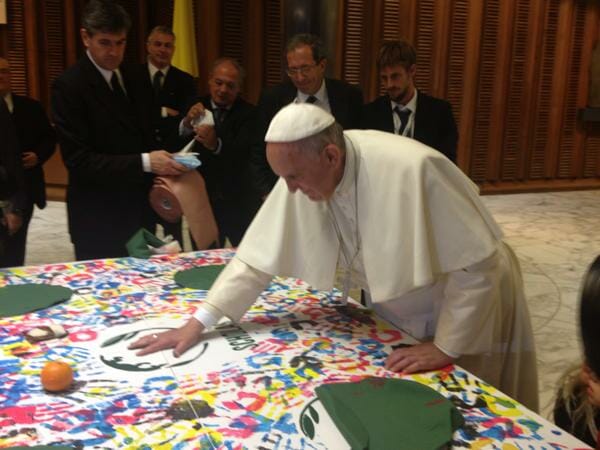
Feb 10, 2015 | Non categorizzato
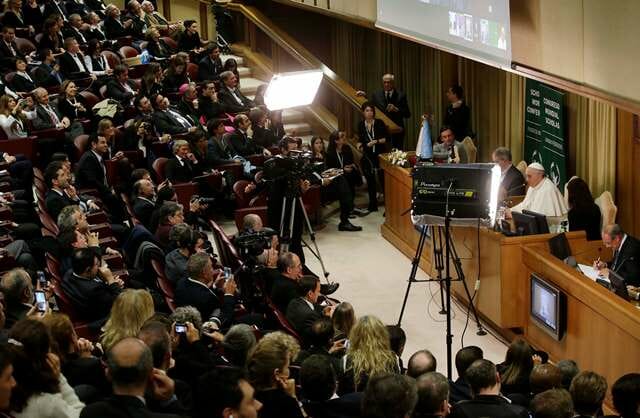 An educational agreement to be built in harmony between the families, civil and cultural institutions. This is the idea on which the project of Scholas Occurrentes (schools that respond to the needs of the population) is based, created in Argentina launched by former Archbishop of Buenos Aires, J.M. Bergoglio and relaunched today at international levels. The aim of the «Scholas is to integrate in some way, the educational efforts of all, and rebuild the educational agreement in harmony, since only with the harmonization of all those in charge of educating our youth and our children, can education bring about change. This is why Scholas seeks to integrate education with culture, sports, science; this is why Scholas tries to build bridges, to move out of the “small-scale” and seek these aspects further beyond. Today this interaction of knowledge is being actualized in all continents, » Pope Francis stressed at the end of the 4th World Congress held in the Vatican from 2-5 February. The climax of the congress, was the video link up with some disabled adolescents who participated in the inclusive scholastic programme of the 400,000 schools participating in the project. Among them was a 13 year old visually-impaired girl, Isabel, who loves athletics and asked the Pope to tell all those who suffer impairments «not to give up, because with some effort, they can achieve their goals.» Yes, because «all of you have a treasure chest inside », Pope Francis said in his video message, «a great treasure. Your task is to open the chest, bring out that treasure, nurture it, share it with others, and also receive the treasure of others.» More than 250 participants, among which, the major experts in the field of education and social responsibility, those professing different creeds and cultures, and delegations of sports organisations, as well as representatives of the world of art, show biz and culture, ITC companies that, through the most advanced technologies, help to «create a classroom where all are welcome,» as José María del Corral, Scholas Director declared.
An educational agreement to be built in harmony between the families, civil and cultural institutions. This is the idea on which the project of Scholas Occurrentes (schools that respond to the needs of the population) is based, created in Argentina launched by former Archbishop of Buenos Aires, J.M. Bergoglio and relaunched today at international levels. The aim of the «Scholas is to integrate in some way, the educational efforts of all, and rebuild the educational agreement in harmony, since only with the harmonization of all those in charge of educating our youth and our children, can education bring about change. This is why Scholas seeks to integrate education with culture, sports, science; this is why Scholas tries to build bridges, to move out of the “small-scale” and seek these aspects further beyond. Today this interaction of knowledge is being actualized in all continents, » Pope Francis stressed at the end of the 4th World Congress held in the Vatican from 2-5 February. The climax of the congress, was the video link up with some disabled adolescents who participated in the inclusive scholastic programme of the 400,000 schools participating in the project. Among them was a 13 year old visually-impaired girl, Isabel, who loves athletics and asked the Pope to tell all those who suffer impairments «not to give up, because with some effort, they can achieve their goals.» Yes, because «all of you have a treasure chest inside », Pope Francis said in his video message, «a great treasure. Your task is to open the chest, bring out that treasure, nurture it, share it with others, and also receive the treasure of others.» More than 250 participants, among which, the major experts in the field of education and social responsibility, those professing different creeds and cultures, and delegations of sports organisations, as well as representatives of the world of art, show biz and culture, ITC companies that, through the most advanced technologies, help to «create a classroom where all are welcome,» as José María del Corral, Scholas Director declared.  And therefore rediscover, the educational itinerary game, education in beauty, rediscovery of harmony between the “language of the brain ” and the “language of the heart” which are the educational programmes the Pope outlined in his speech. It was the spark that lit up in the hearts of the players in the game, presented at the Scholas convention, and who in the previous days had share their experiences, research studies and educational projects in which learning and solidarity merge in a pedagogical strategy open to all: students with particular educational needs, dependence, poverty, care of the environment. To this regard, amongst others, were also some projects of the Focolare, such as the Udisha project in India, mobilization against gambling, with the Slot Mob project in Itay, the Living Peace project in Egypt. Furthermore, two morning sessions were dedicated to deepening the pedagogy of Learning and Solidary Service, developed in the United States in the 60s and promoted over the last twenty years by Maria Nieves Tapia of the Focolare together will many others of the many networks and ogranisations. The CLAYSS (Latina American Centre for learning and Solidary Service,) undertakes to integrate this with dialogue and research studies on fraternity and pro-social activities. The main pedagogical theories were presented at the Congress by Carina Rossa, of Education towards Encounter and Solidarity (EIS) LUMSA and Education and Unity (EDU), theories which the Scholas network is trying to implement. «The youth are the ones who will benefit», concluded Pope Francis, underlining the importance of this work which builds bridges between the youth of all nations and creeds, educating them towards peace and fraternity. He then affirmed: «We will not change the world if we do not change education ». This is a real «rescue plan» put into action, as he had said on other occasions, to limit the reject culture which leaves no room in society for a generation of children and adolescents, and continue believing that «life is a great treasure, but which is meaningful only if shared with others. » To participate in the project, consult: www.scholasoccurrentes.org The Pope’s entire speech
And therefore rediscover, the educational itinerary game, education in beauty, rediscovery of harmony between the “language of the brain ” and the “language of the heart” which are the educational programmes the Pope outlined in his speech. It was the spark that lit up in the hearts of the players in the game, presented at the Scholas convention, and who in the previous days had share their experiences, research studies and educational projects in which learning and solidarity merge in a pedagogical strategy open to all: students with particular educational needs, dependence, poverty, care of the environment. To this regard, amongst others, were also some projects of the Focolare, such as the Udisha project in India, mobilization against gambling, with the Slot Mob project in Itay, the Living Peace project in Egypt. Furthermore, two morning sessions were dedicated to deepening the pedagogy of Learning and Solidary Service, developed in the United States in the 60s and promoted over the last twenty years by Maria Nieves Tapia of the Focolare together will many others of the many networks and ogranisations. The CLAYSS (Latina American Centre for learning and Solidary Service,) undertakes to integrate this with dialogue and research studies on fraternity and pro-social activities. The main pedagogical theories were presented at the Congress by Carina Rossa, of Education towards Encounter and Solidarity (EIS) LUMSA and Education and Unity (EDU), theories which the Scholas network is trying to implement. «The youth are the ones who will benefit», concluded Pope Francis, underlining the importance of this work which builds bridges between the youth of all nations and creeds, educating them towards peace and fraternity. He then affirmed: «We will not change the world if we do not change education ». This is a real «rescue plan» put into action, as he had said on other occasions, to limit the reject culture which leaves no room in society for a generation of children and adolescents, and continue believing that «life is a great treasure, but which is meaningful only if shared with others. » To participate in the project, consult: www.scholasoccurrentes.org The Pope’s entire speech






 “The connecting roads were alternately patrolled by guerrillas and military” continues Filippo, “so you had to find makeshift ways to get around or you would be placed under interrogation that could lead to forced recruitment. “The war had followed the death of Romero and his message was quite alive in everyone.” “The words, the teaching and witness of Bishop Romero,” says Reynaldo, one of the first
“The connecting roads were alternately patrolled by guerrillas and military” continues Filippo, “so you had to find makeshift ways to get around or you would be placed under interrogation that could lead to forced recruitment. “The war had followed the death of Romero and his message was quite alive in everyone.” “The words, the teaching and witness of Bishop Romero,” says Reynaldo, one of the first 


![[:it]Chiara Lubich: «Non c’è porzione di vita indegna di essere vissuta»](https://www.focolare.org/wp-content/uploads/2015/02/20140211ChiaraLubich1986.jpg)

